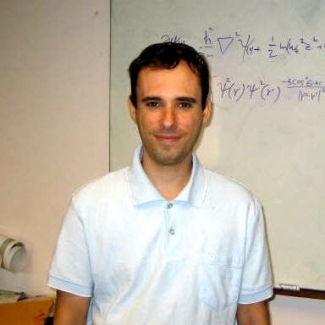Ronen
Specialization: Many-body theory of polar particles.
PhD: Tel Aviv University, 2005.
With group: 2005-2009.
Quote: "It's vague in a confusing way."
Current whereabouts: Industry
Ronen publications with the group
Bogoliubov modes of a dipolar condensate in a cylindrical trap -- S. Ronen, D. C. E. Bortolotti, and J. L. Bohn, Phys. Rev. A 74, 013623 (2006).
Scattering Length Instability in Dipolar Bose Gases -- D. C. E. Bortolotti, S. Ronen, J. L. Bohn, and D. Blume, Phys. Rev. Lett. 97, 160402 (2006).
Dipolar Bose-Einstein Condensates with Dipole-Dependent Scattering Length -- S. Ronen, D. C. E. Bortolotti, D. Blume, and J. L. Bohn, Phys. Rev. A 74, 033611 (2006).
Radial and Angular Rotons in Trapped Dipolar Gases -- S. Ronen, D. C. E. Bortolotti, and J. L. Bohn, Phys. Rev. Lett. 98, 030406 (2007).
Dipolar Bose-Einstein Condensates at Finite Temperature -- S. Ronen and J. L. Bohn, Phys. Rev. A 76 043607 (2007).
Manifestations of the Roton Mode in Dipolar Bose-Einstein Condensates, R. M. Wilson, S. Ronen, J. L. Bohn, and H. Pu, Phys. Rev. Lett. 100, 245302 (2008).
Dynamical Pattern Formation During Growth of a Dual-Species Bose-Einstein Condensate -- S. Ronen, J. L. Bohn, L. E. Halmo, and M. Edwards, Phys. Rev. A 78, 053613 (2008).
Stability and Excitations of a Dipolar Bose-Einstein Condensate with a Vortex -- R. M. Wilson, S. Ronen, and J. L. Bohn, Phys. Rev. A 78, 013621 (2009).
How does a Dipolar Bose-Einstein Condensate Collapse? -- J. L. Bohn, R. M. Wilson, ans S. Ronen, Laser Physics 19, 547 (2009).
Angular Collapse of Dipolar Bose-Einstein Condensates -- R. M. Wilson, S. Ronen, and J. L. Bohn, Phys. Rev. A 80, 023614 (2009).
Critical Superfluid Velocity in a Trapped Dipolar Gas -- R. M. Wilson, S. Ronen, and J. L. Bohn, Phys. Rev. Lett. 104, 094501 (2010).
Zero Sound in Dipolar Fermi Gases -- S. Ronen and J. L. Bohn, Phys. Rev. A 81, 033601 (2010).
Other Ronen publications at JILA
Bragg Spectroscopy of a Strongly Interacting 85Rb Bose-Einstein Condensate -- S. B. Papp, J. M. Pino, R. J. Wyld, S. Ronen, C. E. Wieman, D. S. Jin, and E. A. Cornell, Phys. Rev. Lett. 101, 135301 (2008).
The Dispersion Relation of a Bose Gas in the Intermediate- and High- Momentum Regimes -- S. Ronen, J. Phys. B 42, 055301 (2009).

Industry


 The Physics Frontiers Centers (PFC) program supports university-based centers and institutes where the collective efforts of a larger group of individuals can enable transformational advances in the most promising research areas. The program is designed to foster major breakthroughs at the intellectual frontiers of physics by providing needed resources such as combinations of talents, skills, disciplines, and/or specialized infrastructure, not usually available to individual investigators or small groups, in an environment in which the collective efforts of the larger group can be shown to be seminal to promoting significant progress in the science and the education of students. PFCs also include creative, substantive activities aimed at enhancing education, broadening participation of traditionally underrepresented groups, and outreach to the scientific community and general public.
The Physics Frontiers Centers (PFC) program supports university-based centers and institutes where the collective efforts of a larger group of individuals can enable transformational advances in the most promising research areas. The program is designed to foster major breakthroughs at the intellectual frontiers of physics by providing needed resources such as combinations of talents, skills, disciplines, and/or specialized infrastructure, not usually available to individual investigators or small groups, in an environment in which the collective efforts of the larger group can be shown to be seminal to promoting significant progress in the science and the education of students. PFCs also include creative, substantive activities aimed at enhancing education, broadening participation of traditionally underrepresented groups, and outreach to the scientific community and general public.